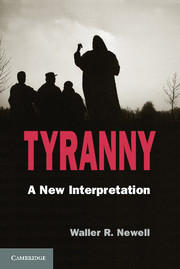Book contents
- Frontmatter
- Contents
- Acknowledgments
- Introduction
- 1 Is There an Ontology of Tyranny?
- 2 The Tyrant and the Statesman in Plato's Political Philosophy and Machiavelli's Rejoinder
- 3 Superlative Virtue, Monarchy, and Political Community in Aristotle's Politics
- 4 Tyranny and the Science of Ruling in Xenophon's Political Thought
- 5 Machiavelli, Xenophon, and Xenophon's Cyrus
- 6 Glory and Reputation
- 7 The Republic in Motion
- Conclusion
- Epilogue
- Bibliography
- Index
1 - Is There an Ontology of Tyranny?
Published online by Cambridge University Press: 05 May 2013
- Frontmatter
- Contents
- Acknowledgments
- Introduction
- 1 Is There an Ontology of Tyranny?
- 2 The Tyrant and the Statesman in Plato's Political Philosophy and Machiavelli's Rejoinder
- 3 Superlative Virtue, Monarchy, and Political Community in Aristotle's Politics
- 4 Tyranny and the Science of Ruling in Xenophon's Political Thought
- 5 Machiavelli, Xenophon, and Xenophon's Cyrus
- 6 Glory and Reputation
- 7 The Republic in Motion
- Conclusion
- Epilogue
- Bibliography
- Index
Summary
In this chapter, I set forth the main premise of this book – that the classical understanding of tyranny viewed it as a deformed and excessive version of eros, the cure for which lay in the proper redirection of eros toward civic virtue and philosophy. In contrast, I argue, modern political thought, beginning with Machiavelli, understands statecraft as originating in an act of will that attempts to master nature, and above all to master the passions expressed through eros. Thus, whereas for the ancients, both the problem of and the therapy for tyranny take place within the natural order and man's place in it, for the moderns, tyranny is assimilated to a project for the rational conquest and control of nature, including and especially human nature, starting with the prince's own.
Because I am proceeding at a certain level of abstraction, let me furnish some preliminary content by beginning with a specific set of contrasts between Machiavelli and his closest point of contact among the ancients, Xenophon, a linkage to which we return a number of times throughout the studies that follow. The most important difference between them is the extent to which Xenophon's writings on princely rule (culminating in the Education of Cyrus) explore a kind of high political hedonism. Cyrus's motivation as Xenophon depicts him in the Education of Cyrus is not only the pursuit of honor but also the pursuit of pleasure from the successful arrangement of his life and tastes. More importantly, he is consumed by an eros to gratify “all men” (1.1.5) without their being in a position to gratify him in return. In this respect, Xenophon's presentation of his rise to empire is a riposte to the Aristotelian contention that liberality could be confined within the boundaries of the polis and republican self-government. The perfection of this virtue of character, Xenophon maintains, requires an imperial politics. Xenophon's exploration of political honor seeking as hedonistically motivated is further revealed by the fact that Cyrus's empire is the attempt to actualize the teaching about the Good explored by the Xenophontic Socrates, a teaching that (in contrast to Plato's Republic) is not only not necessarily connected to a polis but in fact cannot be reconciled with republican government. Ruling on behalf of the Socratic Good, Cyrus builds a cosmopolitan multinational empire based on the architectonic division of labor (to this extent alone like the Republic) and the ability of individuals to actualize their respective capacities and enjoy the rewards of their merit.
- Type
- Chapter
- Information
- TyrannyA New Interpretation, pp. 26 - 80Publisher: Cambridge University PressPrint publication year: 2013



